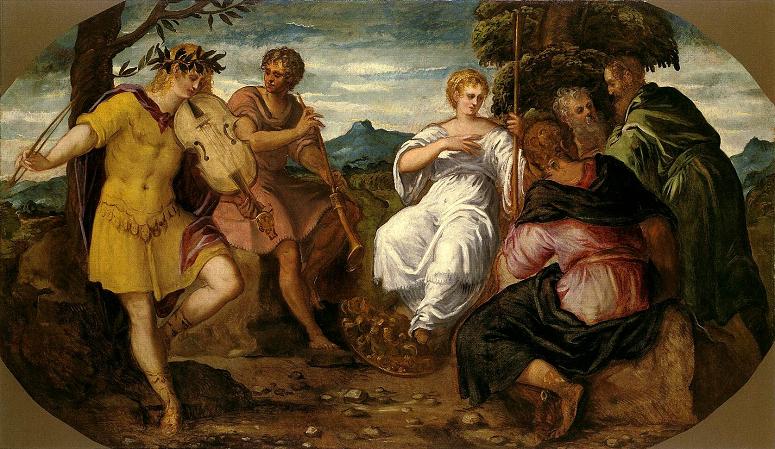Apollo. Apollo is one of the most important and complex of the Olympian deities in classical Greek and Roman religion and Greek and Roman mythology. The national divinity of the Greeks, Apollo has been recognized as a god of archery, music and dance, truth and prophecy, healing and diseases, the Sun and light, poetry, and more. He is the son of Zeus and Leto, and the twin brother of Artemis, goddess of the hunt. Seen as the most beautiful god and the ideal of the kouros, Apollo is considered to be the most Greek of all gods. Apollo is known in Greek-influenced Etruscan mythology as Apulu. As the patron deity of Delphi, Apollo is an oracular god, the prophetic deity of the Delphic Oracle. Medicine and healing are associated with Apollo, whether through the god himself or mediated through his son Asclepius, yet Apollo is also a god who could bring ill-health and deadly plague with his arrows. Apollo is the god of archery and the invention of archery is credited to him and his sister Artemis. He has a golden bow and arrows. As the god of Mousike, Apollo presides over all music, songs, dance and poetry. He is the inventor of string-music, and the frequent companion of the Muses, functioning as their chorus leader in celebrations. The lyre is a common attribute of Apollo. As the protector of young, Apollo is concerned with the health and education of children, and he presided over their passage into adulthood. Apollo is an important pastoral deity, and was the patron of herdsmen and shepherds. Protection of herds, flocks and crops from diseases and pests were his primary duties. Apollo encouraged founding new towns and establishment of civil constitution, and is associated with dominion over colonists. He is also the giver of laws, and his oracles were consulted before setting laws in a city. Apollo is the god who affords help and wards off evil. He delivered men from epidemics. Various epithets call him the averter of evil. As the patron of seafarers, he is also the god of foreigners, the protector of fugitives and refugees. In Hellenistic times, especially during the 5th century BCE, as Apollo Helios he became identified among Greeks with Helios, Titan god of the sun. In Latin texts, however, there was no conflation of Apollo with Sol among the classical Latin poets until 1st century CE. Apollo and Helios/Sol remained separate beings in literary and mythological texts until the 5th century CE. The name Apollo, unlike the related older name Paean, is generally not found in the Linear B texts, although there is a possible attestation in the lacunose form ]pe-rjo--aploun, simple, in particular in reference to the Thessalian form of the name, and finally with, ever-shooting. Hesychius connects the name Apollo with the Doric, which means assembly, so that Apollo would be the god of political life, and he also gives the explanation, fold, in which case Apollo would be the god of flocks and herds. In the ancient Macedonian language means stone, and some toponyms may be derived from this word: and. A number of non-Greek etymologies have been suggested for the name, The Hittite form Apaliunas is attested in the Manapa-Tarhunta letter, perhaps related to Hurrian Aplu, a god of plague, in turn likely from Akkadian Aplu Enlil meaning simply the son of Enlil, a title that was given to the god Nergal, who was linked to Shamash, Babylonian god of the sun.The role of Apollo as god of plague is evident in the invocation of Apollo Smintheus by Chryses, the Trojan priest of Apollo, with the purpose of sending a plague against the Greeks.
more...














